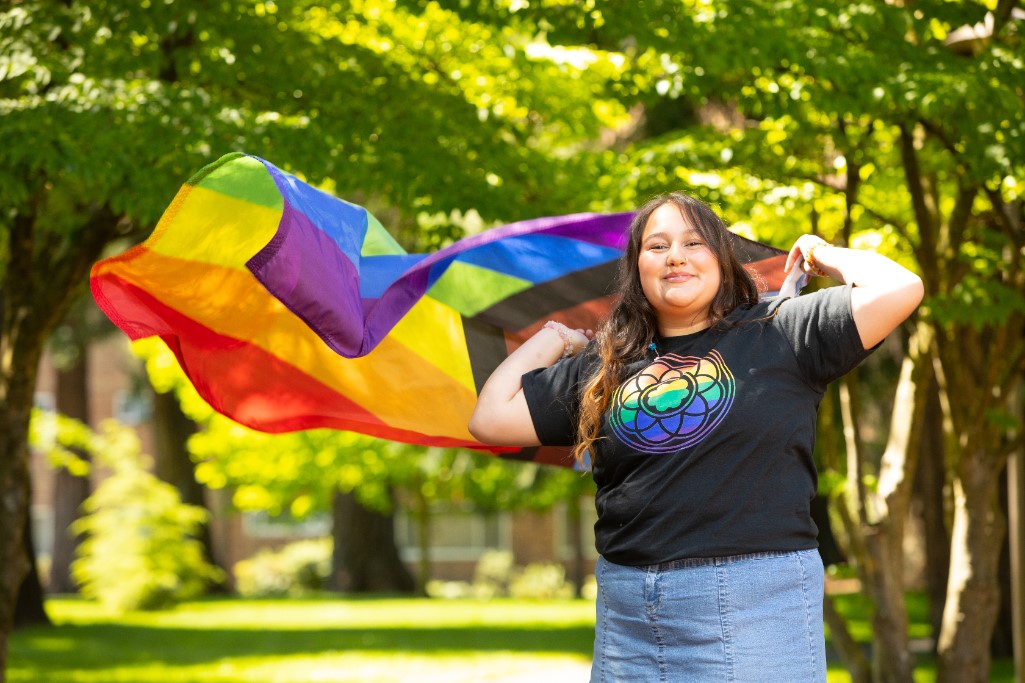Page 186 • (1,958 results in 0.576 seconds)
-

hand-drawn bowling pin and the title “anthroPINmetrics”] Paphawee: that I’m not just sitting down in lecture but actually doing it [video: Paphawee stands in Olson Gymnasium.] Paphawee: So my personal experience in class has been amazing all the classes are evident based in theoretical base [video: Paphawee’s voice continues over photos. A professor teaches a class about throwing motions. A selfie of professors at a bowling alley.] Paphawee: so professors really for their part and their passion to
-
possible, says Suzanne Moore, a Vashon Island-based book artist who served as one of just two American illuminators for The Saint John’s Bible. “It’s the only way it could get done,” she said in a sunlit art studio, reminiscing about her contribution to the most ambitious book-arts project of our time. Coming to terms with the 'L' in PLUSenior Editor Kari Plog describes how she was drawn to PLU and The Saint John's Bible for the same reasons. Moore was one of 23 artists who worked on 160 illuminations
-

clubs for students based on identities and interests. DISCOVER About Calendar Campus Map Land Acknowledgement Careers at PLU Lute Locker PLANNING Student Payments Textbooks Make a Gift Conference Planning RESOURCES Privacy Non-Discrimination Policy Accessibility Emergency Procedures Mailing Policy & Procedures Consumer Information Flag Display Stay Connected 12180 Park Avenue S. Tacoma, WA 98447 253-535-7411 | events@plu.edu © Pacific Lutheran University. All rights reserved.
-
Information in the Time of COVID-19Updated January 14, 2020 at 8:45am. This webpage provides guidance and information given the unique situation of teaching and learning during the COVID-19 pandemic. This information is compiled based on information and emerging policies from the university, Education Department, The Professional Educator Standards Board (PESB), and questions submitted by students. We will update the content as new information becomes available and we further adapt our
-
all possible, install the program before you arrive. What anti-virus alternatives do I have to the ones recommended by I&TS? Is one free anti-virus better than others? Are paid anti-virus programs better than free ones?Information & Technology Services staff recommend free anti-virus software based on our experience with these programs and the programs’ own performance record. Our experience suggests that each anti-virus performed on average about as well as its contemporaries. The major
-
based on the type of disability or your previous experience with other students. Commenting on the student’s disability or accommodation plans in front of or within earshot of others. Complaining to the student about providing accommodations. Challenging the student to explain the need for accommodations. Publicly “singling out” or identifying students with disabilities to the rest of your class, even to be helpful. Leaving a Faculty Notification Letter in plain view of other students. Providing
-

abroad in Europe, but knew little about Africa or Islam. “My world view was very narrow,” she admitted. Mauritania expanded it, rapidly. “It was a fantastic experience,” she said, “which I benefited from way more than the people I was quote-unquote ‘helping.’” Wiley’s new book, Work, Social Status, and Gender in Post-Slavery Mauritania (Indiana University Press), is based on anthropological research she conducted on a return trip years later. It focuses on women who are Haratine — a term that refers
-
kid from northern New York, she’d studied abroad in Europe, but knew little about Africa or Islam. “My world view was very narrow,” she admitted. Mauritania expanded it, rapidly. “It was a fantastic experience,” she said, “which I benefited from way more than the people I was quote-unquote ‘helping.’” Wiley’s new book, Work, Social Status, and Gender in Post-Slavery Mauritania (Indiana University Press), is based on anthropological research she conducted on a return trip years later. It focuses on
-
rest of your life.” Manfredi stressed that it isn’t unique for college students to study in China; many institutions have programs based in the two major cities in the eastern part of the country — Beijing and Shanghai. PLU’s program, however, is located in western China, in Sichuan’s provincial capital. That, he says, is distinct. “It’s far from those cosmopolitan centers,” he said. “It’s somewhat off the beaten path, though maybe a little bit less so since we started the program.” At the time the
-

competitive full-tuition engineering fellowship from Washington University in St. Louis, and several others have received half-tuition awards and other merit-based scholarships. Did you know? Most students pursue the physics degree while at PLU, but if you’re interested in chemical engineering or biomedical engineering, you can choose to study chemistry at PLU instead. Did you know? Dual-degree students can participate in PLU’s Natural Sciences Summer Undergraduate Research Program (NSSURP), which
Do you have any feedback for us? If so, feel free to use our Feedback Form.


